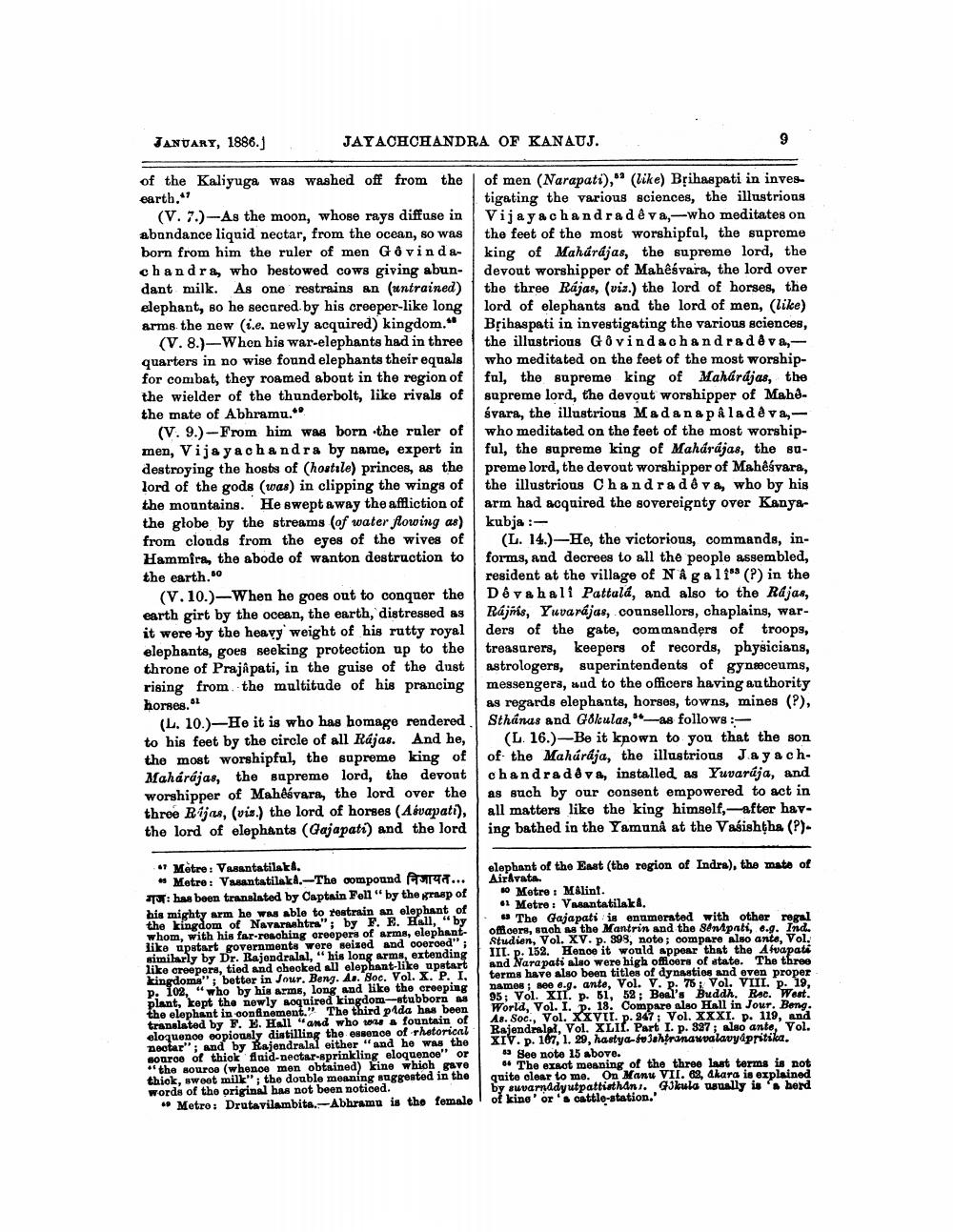________________
JANUARY, 1886.)
JAYACHCHANDRA OF KANAUJ.
of the Kaliyuga was washed off from the earth."
(V. 7.)- As the moon, whose rays diffuse in abundance liquid nectar, from the ocean, so was born from him the ruler of men Govindachandra, who bestowed cows giving abundant milk. As one restrains an (untrained) elephant, so he secured by his croeper-like long arms the new (i.e. newly acquired) kingdom.“
(V. 8.)-When his war-elephants had in three quarters in no wise found elephants their equals for combat, they roamed about in the region of the wielder of the thunderbolt, like rivals of the mate of Abhramu."
(V. 9.)-From him was born the ruler of men, Vijayachandra by name, expert in destroying the hosts of (hostile) princes, as the lord of the gods (was) in clipping the wings of the mountains. He swept away the affliction of the globe by the streams (of water flowing as) from clouds from the eyes of the wives of Hammira, the abode of wanton destruction to the earth.50
(V.10.)-When he goes out to conquer the earth girt by the ocean, the earth, distressed as it were by the heavy weight of his rutty royal elephants, goes seeking protection up to the throne of Prajapati, in the guise of the dust rising from the multitude of his prancing horses."
(L. 10.)-He it is who has homage rendered to his feet by the circle of all Rájas. And he, the most worshipful, the supreme king of Mahárájas, the supreme lord, the devout worshipper of Maheśvara, the lord over the three Rijas, (vis.) the lord of horses (Advapati), the lord of elephants (Gajapatı) and the lord
of men (Narapati)," (like) Bțihaspati in investigating the various sciences, the illustrious Vijayachandradê va,-who meditates on the feet of the most worshipful, the supreme king of Mahúrájas, the supreme lord, the devout worshipper of Mahêsvara, the lord over the three Rájas, (viz.) the lord of horses, the lord of elephants and the lord of men, (like) Brihaspati in investigating the various sciences, the illustrious Govinda chandrade va, who meditated on the feet of the most worshipful, the supreme king of Maharajas, the supreme lord, the devout worshipper of Mahdšvara, the illustrious Madana påladeva, - who meditated on the feet of the most worshipful, the supreme king of Mahárájas, the supreme lord, the devout worshipper of Mahêśvara, the illustrious Chandraddva, who by his arm had acquired the sovereignty over Kanyakubja :
(L. 14.)-He, the victorious, commands, informs, and decrees to all the people assembled, resident at the village of NÂg a 11" (?) in the Dé va hali Pattuld, and also to the Rájas, Rájnis, Yuvardjas, counsellors, chaplains, warders of the gate, commanders of troops, treasurers, keepers of records, physicians, astrologers, superintendents of gynæceums, messengers, uud to the officers having authority as regards elephants, horses, towns, mines (?), Sthanas and Gélulas," as follows
(L. 16.)-Be it known to you that the son of the Mahúrája, the illustrious Jayach. chandradê va, installed as Yuvarája, and as such by our consent empowered to act in all matters like the king himself, -after having bathed in the Yamunâ at the Vašishtha (?)
1
1 Metre: Vasantatilaka. * Metre : Vantatilaka. The compound orga... Tor: has been translated by Captain Fell" by the grasp of his mighty arm he was able to restrain an elephant of the kingdom of Navarnshtra": by F. E. Hall, “by whom, with his far-rosohing oroopers of arms, elephantlike upstart governments were seized and coorood"; similarly by Dr. Rajendralal, his long arms, extending like creépera, tied and cheoked all elephant-like upatart kingdoms"; better in Jour. Beng. As. Soc. Vol. X. P. I, p. 102, “who by his arms, long and like the creeping plant, kept the newly soquired kingdom-stubborn the elephant in oonfinement. The third pida has been translated by F. E. Hall and who wou a fountain of eloquence sopiously distilling the essence of rhetorical Deotar"; and by Rajendralal either and he was the source of thick fluid-nectar-sprinkling eloquence" or *the source (whence mon obtained) kine which gave thick, sweet milk"; the double meaning suggested in the words of the original has not been noticed.
Metre: Drutavilambito.-Abhramu is the female
elephant of the East (the region of Indra), the mate of AirAvata.
Metre: Malint. •1 Metre : Vasantatilak A.
- The Gajapati is enumerated with other regal ofhoors, such as the Mantrin and the sinpati. 6.9. Ind. Studien, Vol. XV. p. 899, noto; compare also ante, Vol. IIL. P. 152. Honoo it would appear that the Afvapate and Narapati also were high offioers of state. The three terms have also been titles of dynasties and even proper names: see e.g. ante, Vol. V. p. 76: Vol. VIIL. P. 19, 95; Vol. XII. p. 51, 52; Beal's Buddh. Rac. West. World, Vol. I. p. 18. Compare also Hall in Jour. Beng. As. Soc., Vol. XXVII. p. 947; Vol. XXXI. p. 119, and Rajendralel, Vol. XLII. Part I. p. 327; also ante, Yol. XIV. p. 167, 1. 29, hastya-fu Jahtranavvalavyápritika.
See note 15 above. . *4 The exact meaning of the three last terms is not quite clear to me. On Manu VII. 62, dkara is explained by suvarnddyutpattinthan. GJkula usually is 's herd of kine' or ''scattlo-station.'




